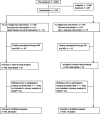The effect of randomization to weight loss on total mortality in older overweight and obese adults: the ADAPT Study
- PMID: 20080875
- PMCID: PMC3107029
- DOI: 10.1093/gerona/glp217
The effect of randomization to weight loss on total mortality in older overweight and obese adults: the ADAPT Study
Abstract
Background: Although weight loss reduces risk for comorbid diseases, many observational studies suggest that weight loss is associated with increased mortality risk, leading to reluctance by clinicians to consider weight reduction as a strategy to maintain health and independence in older adults. However, whether the observed weight loss is intentional is difficult to determine and may not accurately represent the mortality risk associated with intentional weight reduction. Data from the Arthritis, Diet, and Activity Promotion Trial (ADAPT) were used to determine whether randomization to a weight reduction program was associated with total mortality in overweight/obese older adults.
Methods: ADAPT (n = 318; mean age 69 +/- 6 years, body mass index 34 +/- 5 kg/m2, 72% female) assessed the influence of weight loss (achieved through dietary counseling and lifestyle modification) and/or exercise on function in overweight/obese older adults with knee osteoarthritis. ADAPT ended in December 1999. Participant vital was ascertained status through December 2006 using the National Death and Social Security Indexes.
Results: The mortality rate for those randomized to the 18-month weight loss intervention (n = 159, mean weight loss = -4.8 kg, 15 deaths) was lower than that for those not randomized to the weight loss intervention (n = 159, mean weight loss = -1.4 kg, 30 deaths; hazard rate ratio = 0.5, 95% confidence interval 0.3-1.0). Results were not appreciably changed when analyses were stratified by age, gender, baseline weight status, or magnitude of weight loss.
Conclusions: In older adults, intentional weight loss was not associated with increased total mortality and may reduce mortality risk. Observational studies of weight loss, especially when intentionality cannot be rigorously established, may be misleading with respect to the effect of weight loss on mortality.
Figures



Comment in
-
Re: Randomized trial of weight loss and total mortality.J Gerontol A Biol Sci Med Sci. 2010 Aug;65(8):904; author reply 905. doi: 10.1093/gerona/glq075. Epub 2010 May 13. J Gerontol A Biol Sci Med Sci. 2010. PMID: 20466774 No abstract available.
Similar articles
-
The effect of intentional weight loss on all-cause mortality in older adults: results of a randomized controlled weight-loss trial.Am J Clin Nutr. 2011 Sep;94(3):839-46. doi: 10.3945/ajcn.110.006379. Epub 2011 Jul 20. Am J Clin Nutr. 2011. PMID: 21775558 Free PMC article. Clinical Trial.
-
Exercise and dietary weight loss in overweight and obese older adults with knee osteoarthritis: the Arthritis, Diet, and Activity Promotion Trial.Arthritis Rheum. 2004 May;50(5):1501-10. doi: 10.1002/art.20256. Arthritis Rheum. 2004. PMID: 15146420 Clinical Trial.
-
Prospective study of intentional weight loss and mortality in overweight white men aged 40-64 years.Am J Epidemiol. 1999 Mar 15;149(6):491-503. doi: 10.1093/oxfordjournals.aje.a009843. Am J Epidemiol. 1999. PMID: 10084238
-
A review and meta-analysis of the effect of weight loss on all-cause mortality risk.Nutr Res Rev. 2009 Jun;22(1):93-108. doi: 10.1017/S0954422409990035. Nutr Res Rev. 2009. PMID: 19555520 Review.
-
Intentional weight loss in older adults: useful or wasting disease generating strategy?Curr Opin Clin Nutr Metab Care. 2013 May;16(3):284-9. doi: 10.1097/MCO.0b013e32835f503f. Curr Opin Clin Nutr Metab Care. 2013. PMID: 23429407 Review.
Cited by
-
Intentional weight loss and all-cause mortality: a meta-analysis of randomized clinical trials.PLoS One. 2015 Mar 20;10(3):e0121993. doi: 10.1371/journal.pone.0121993. eCollection 2015. PLoS One. 2015. PMID: 25794148 Free PMC article.
-
Intensity and duration of lifestyle interventions for long-term weight loss and association with mortality: a meta-analysis of randomised trials.BMJ Open. 2019 Aug 18;9(8):e029966. doi: 10.1136/bmjopen-2019-029966. BMJ Open. 2019. PMID: 31427335 Free PMC article.
-
Practical dietary interventions to prevent cardiovascular disease suitable for implementation in primary care: an ADAPTE-guided systematic review of international clinical guidelines.Int J Behav Nutr Phys Act. 2023 Jul 28;20(1):93. doi: 10.1186/s12966-023-01463-9. Int J Behav Nutr Phys Act. 2023. PMID: 37507692 Free PMC article.
-
A metabolically healthy obese phenotype in hispanic participants in the IRAS family study.Obesity (Silver Spring). 2013 Nov;21(11):2303-9. doi: 10.1002/oby.20326. Epub 2013 May 29. Obesity (Silver Spring). 2013. PMID: 23418072 Free PMC article.
-
Caloric restriction for treatment of geriatric obesity: Do the benefits outweigh the risks?Curr Nutr Rep. 2015 Jun;4(2):143-155. doi: 10.1007/s13668-015-0123-9. Curr Nutr Rep. 2015. PMID: 26213640 Free PMC article.
References
-
- Messier SP, Loeser RF, Miller GD, et al. Exercise and dietary weight loss in overweight and obese older adults with knee osteoarthritis: the Arthritis, Diet, and Activity Promotion Trial. Arthritis Rheum. 2004;50(5):1501–1510. - PubMed
-
- Villareal DT, Miller BV, III, Banks M, Fontana L, Sinacore DR, Klein S. Effect of lifestyle intervention on metabolic coronary heart disease risk factors in obese older adults. Am J Clin Nutr. 2006;84(6):1317–1323. - PubMed
-
- Whelton PK, Appel LJ, Espeland MA, et al. Sodium reduction and weight loss in the treatment of hypertension in older persons: a randomized controlled trial of nonpharmacologic interventions in the elderly (TONE). TONE Collaborative Research Group. JAMA. 1998;279(11):839–846. - PubMed
-
- Sorensen TI. Weight loss causes increased mortality: pros. Obes Rev. 2003;4(1):3–7. - PubMed

